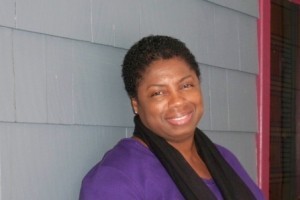Zetta Elliott's Blog, page 70
October 24, 2012
November line-up
It’s another rainy day and I’ll be giving my last midterm later this morning but I thought I’d take a moment to list some upcoming events:
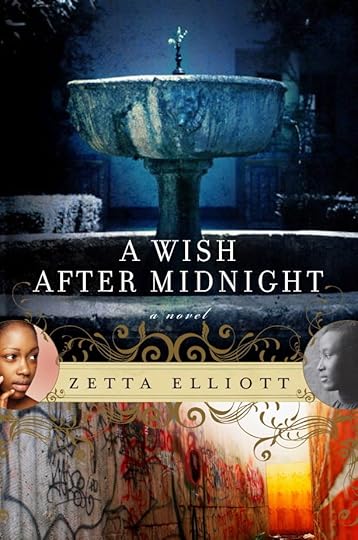 On November 3rd I’ll be presenting at the Richland County Public Library in Columbia, SC. Dr. Michelle Martin of USC is teaching Wish so I’ll have a chance to meet with her graduate students, and then I’ll give a public talk with members of the library’s Teen Advisory Board. If you’re in the vicinity, stop by! Before I return to NYC I’ll have a chance to meet students at Westwood HS. Hopefully being in the South will help me finish up Judah’s Tale–I’m nearing 74K words and hope to wrap up at 80. I’ve already made a list of plantations I hope to visit while I’m in the midlands…
On November 3rd I’ll be presenting at the Richland County Public Library in Columbia, SC. Dr. Michelle Martin of USC is teaching Wish so I’ll have a chance to meet with her graduate students, and then I’ll give a public talk with members of the library’s Teen Advisory Board. If you’re in the vicinity, stop by! Before I return to NYC I’ll have a chance to meet students at Westwood HS. Hopefully being in the South will help me finish up Judah’s Tale–I’m nearing 74K words and hope to wrap up at 80. I’ve already made a list of plantations I hope to visit while I’m in the midlands…
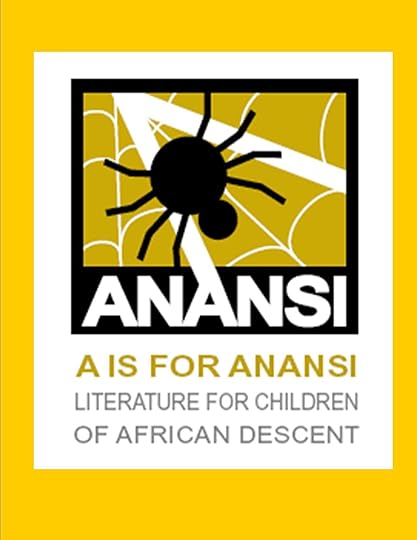 On November 9-10th I’ll be attending the second A Is for Anansi conference at NYU. I’m moderating the SFF panel on Saturday morning but am really looking forward to hearing Michelle Martin’s keynote address the night before. If you’re in NYC you definitely don’t want to miss this! I will miss some of the afternoon sessions because I’ve been invited to speak at Girls Write Now, a fantastic nonprofit that’s celebrating its 15th year of pairing teenage girls with professional writer-mentors. I’ll be speaking about historical fiction and can’t wait to meet these amazing young women writers.
On November 9-10th I’ll be attending the second A Is for Anansi conference at NYU. I’m moderating the SFF panel on Saturday morning but am really looking forward to hearing Michelle Martin’s keynote address the night before. If you’re in NYC you definitely don’t want to miss this! I will miss some of the afternoon sessions because I’ve been invited to speak at Girls Write Now, a fantastic nonprofit that’s celebrating its 15th year of pairing teenage girls with professional writer-mentors. I’ll be speaking about historical fiction and can’t wait to meet these amazing young women writers.
 On November 17th I’ll be at the Brooklyn Museum Book Fair—one of my favorite kidlit events! Come out with your kids and enjoy an afternoon of books, authors, readings, and fun activities. The next weekend is Thanksgiving and I’ll be heading up to Toronto. If you’re in the city and would like to book a visit, let me know! Though I may be ready for a break by then…
On November 17th I’ll be at the Brooklyn Museum Book Fair—one of my favorite kidlit events! Come out with your kids and enjoy an afternoon of books, authors, readings, and fun activities. The next weekend is Thanksgiving and I’ll be heading up to Toronto. If you’re in the city and would like to book a visit, let me know! Though I may be ready for a break by then…


October 14, 2012
mix & match
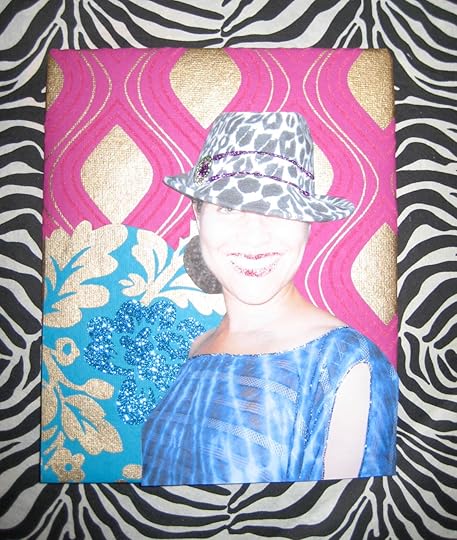 Collage is harder than it looks! I’m trying out an art project with my nieces in Nova Scotia—the Mickalene Project. They couldn’t see the exhibit at the BK Museum so I thought this would be a fun way for them to learn about her work and make some art of their own. I’m a writer and I haven’t been writing lately, which sucks. Apparently I wrung the sponge dry in September; I wrote about 10K words but fell short of my 20K-word goal. This month I’ve barely cracked 1K, yet here I am cutting and pasting and playing with glitter. On the train I’m reading Hanging Captain Gordon, which is about the only slave trader hanged for his crimes against humanity in NYC in 1862. I *loathe* naval history but have to become familiar with the blockades and revenue cutters and smugglers operating along the Atlantic coast. Putting Judah on a ship is hard but having him on a slave coffle is harder. How far did they walk? Were battles being fought all around them? Sometimes I wonder why I write historical fiction—all the fact-checking is time-consuming and tedious. And I only wind up using 10% of all this research. I started reading Sugar in the Blood last week and immediately began dreaming of Nevis again. But I need to focus on Judah’s Tale right now so those dreams will have to wait…
Collage is harder than it looks! I’m trying out an art project with my nieces in Nova Scotia—the Mickalene Project. They couldn’t see the exhibit at the BK Museum so I thought this would be a fun way for them to learn about her work and make some art of their own. I’m a writer and I haven’t been writing lately, which sucks. Apparently I wrung the sponge dry in September; I wrote about 10K words but fell short of my 20K-word goal. This month I’ve barely cracked 1K, yet here I am cutting and pasting and playing with glitter. On the train I’m reading Hanging Captain Gordon, which is about the only slave trader hanged for his crimes against humanity in NYC in 1862. I *loathe* naval history but have to become familiar with the blockades and revenue cutters and smugglers operating along the Atlantic coast. Putting Judah on a ship is hard but having him on a slave coffle is harder. How far did they walk? Were battles being fought all around them? Sometimes I wonder why I write historical fiction—all the fact-checking is time-consuming and tedious. And I only wind up using 10% of all this research. I started reading Sugar in the Blood last week and immediately began dreaming of Nevis again. But I need to focus on Judah’s Tale right now so those dreams will have to wait…


October 8, 2012
2013 Virginia Hamilton Conference
Thursday, April 4, and Friday, April 5, 2013
Online Conference Registration
Kent State University’s 29th Annual Virginia Hamilton Conference on Multicultural Literature for Youth will be held on the evening of Thursday, April 4, 2013, and all day on Friday, April 5, 2013, at the Kent Student Center. The conference provides a forum for discussion of multicultural themes and issues in literature for children and young adults. “Dreams and Promises: Multicultural Literature and the Common Core” is the theme for this year’s conference, which features the remarkable Angela Johnson, the talented Gary Schmidt and the amazing illustrator Yuyi Morales.


October 7, 2012
give thanks
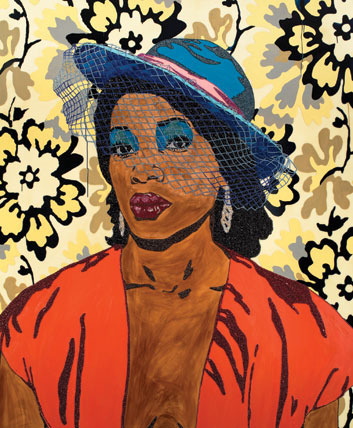 It’s Thanksgiving weekend up in Canada, which usually makes me crave Stove Top stuffing and pumpkin pie. This year I actually haven’t thought of holiday food, in part because I have some Canadian friends in town and instead we’ve been catching up on politics. I realize that one way to minimize job stress is to spend a couple of days NOT grading, NOT developing lesson plans, and NOT attending work-related events. The latter is especially hard to do—on Saturday I went to the Brooklyn Museum with friends to see the Mickalene Thomas exhibit, which is phenomenal. I saw one of my students, which I expected, since I offered extra credit to my Black Women in the Americas class. I walked out of the gallery feeling an overwhelming sense of pride—Thomas is brilliant and I’m sure my students will be blown away by her glittering portraits of black women.
It’s Thanksgiving weekend up in Canada, which usually makes me crave Stove Top stuffing and pumpkin pie. This year I actually haven’t thought of holiday food, in part because I have some Canadian friends in town and instead we’ve been catching up on politics. I realize that one way to minimize job stress is to spend a couple of days NOT grading, NOT developing lesson plans, and NOT attending work-related events. The latter is especially hard to do—on Saturday I went to the Brooklyn Museum with friends to see the Mickalene Thomas exhibit, which is phenomenal. I saw one of my students, which I expected, since I offered extra credit to my Black Women in the Americas class. I walked out of the gallery feeling an overwhelming sense of pride—Thomas is brilliant and I’m sure my students will be blown away by her glittering portraits of black women.
I haven’t managed to do any writing this month, which is disappointing. But I was heartened to learn that Teaching for Change has a fantastic post on Banned Books Week and the OTHER barriers to equal expression:
Government censorship, of course, is just one element that determines what we can and cannot read. People often overlook another cultural phenomenon that can have a similar effect: publishing industry censorship. Each year there is a scarcity of excellent children’s picture books published. Missing are titles that reflect the realities of students’ lives and communities while encouraging children to think beyond the headlines.
The data bears out our suspicion: Researchers at the University of Wisconsin’s Cooperative Children’s Book Center find the number of books by and about people of color fluctuating and decreasing slightly, at the same time that children in the United States increasingly come from families of color. This doesn’t mean that those books aren’t being written—rather publishers refuse to seek them out or reject them, fearing they lack universal appeal, or as one frustrated former editor laments, fail to speak to “the lowest common denominator.” Zetta Elliott, author of the award-winning children’s book Bird, writes on her blog that she is fighting to find publishers for her many children’s book manuscripts. Some are “slice of life stories.” Others, like Bird, speak sensitively to childhood trauma.
The post concludes with a list of wonderful books that have since gone out of print. It’s a wonderful resource for teachers and parents seeking books that truly reflect the diversity of our society.


October 1, 2012
Save the date–Anansi is back!
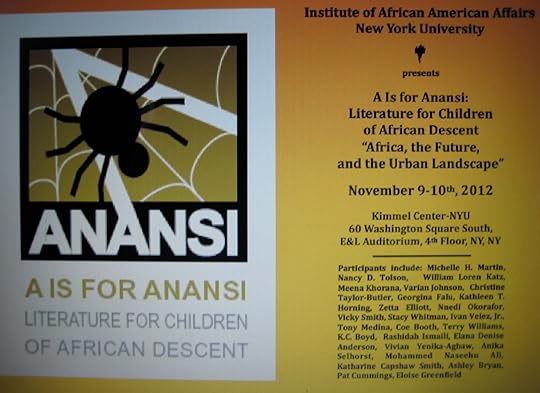 I hope we’ll see you there! I will be moderating the fantasy panel on Saturday morning.
I hope we’ll see you there! I will be moderating the fantasy panel on Saturday morning.
Institute of African American Affairs
New York University
presents
A Is for Anansi: Literature for Children of African Descent
“Africa, the Future, and the Urban Landscape”
November 9-10th, 2012
Location for all programs: Kimmel Center-NYU,
60 Washington Square South, E&L Auditorium, 4th Floor
“A Is for Anansi: Africa, the Future, and the Urban Landscape,” the second conference hosted by the Institute of African American Affairs, aims to deepen and diversify the cannon, conversation and scholarship of the literature as told by its most influential critics, scholars, teachers and producers. The need for more in-depth analysis and for more information, critical evaluation, and publications on this topic still remains. The conference will look at these and consider other questions and issues as well.
Keynote by Dr. Michelle H. Martin
Panels include Fantasy: The Final Frontier, Urban Landscapes, Africa Imagined
Panelists include: Nancy Tolson, William Loren Katz, Meena Khorana, Varian Johnson, Christine Taylor-Butler, Georgina Falu, Kathleen Horning, Zetta Elliott, Nnedi Okorafor, Vicky Smith, Stacy Whitman, Ivan Velez, Jr., Tony Medina, Coe Booth, Terry Williams, K.C. Boyd, Rashidah Ismaili, Elana Denise Anderson, Vivian Yenika-Agbaw, Anika Selhorst, Mohammed Naseehu Ali, Katharine Capshaw Smith
Anansi Award will be presented to Ashley Bryan, Pat Cummings, William Loren Katz, and Eloise Greenfield
Free and open to the public. Space is limited.
Please RSVP at (212) 998-IAAA (4222)
For more information please visit:
http://africanastudies.as.nyu.edu/obj...
Schedule:
Friday, November 9th, 2012 – Opening Reception
6-6:30 pm
● Opening KEYNOTE
6:30-8:00 pm
● Perceptions and Realities: When Color Blinds and Reveals
Perceptions of how notions of whiteness/blackness, both implicit and implied, are presented and their effects. Borrowing a page from Toni Morrison’s Playing in the Dark, whiteness and blackness in the literary imagination.
Saturday, November 10th, 2012
Registration – 9-9:30 am
9:30 – 11:00 am
● Fantasy: The Final Frontier
The scarcity of fantasy/science-fiction books featuring children of African decent.
11:00 – 12:30 pm
● Children’s panel: “If I Ruled the World”
As a teacher / publisher / writer / reader how they see themselves in the world and how they are depicted. If they were in control and in power/what would they teach, assign to read, defending it why and why not.
Lunch – 12:30 – 1:30 pm
1:30 – 3:00 pm
● Urban Landscapes: Stories for a Global World, Realism and Dominant Images
The lure of urban life and culture, its offerings and sacrifices. What the urban landscape does to the literature and vice versa. How the black urban experience is interpreted and reimagined. How does dwindling rural development and shifts to urban landscapes fragment and reconstruct lives and cultural retentions?
3:00 – 4:30 pm
● Africa Imagined
“What is Africa to me” remains a fundamental question in all Africana studies. How African culture is identified, constructed in the literature.
4:30 – 5:00 pm
CLOSURE/ROUND UP/SURVEY
5:00 PM
AWARD RECEPTION
● Tribute to Ashley Bryan, Pat Cummings, William Loren Katz, and Eloise Greenfield


September 29, 2012
spice girl
This past summer I had the chance to share my beloved Brooklyn with the amazing educator/blogger/author Ed Spicer. Filming in Prospect Park was a bit of a challenge (we’re in the flight path of 2 major airports) but Ed still managed to make a great short film—take a look!



September 24, 2012
To … with love
 We’re five weeks into the semester and I’ve already caught my first cold. Stress weakens your immune system, so I suspect that the confrontation I had with two students last week probably contributed to my health breakdown. Or rather, not the incident itself but the fact that I dwelt on it for days afterward. Someone just posted this article on Facebook: “Why I Quit Teaching.” That struck a chord with me. This is the most challenging semester I can remember, and even though the vast majority of my students are following the rules and making progress, I still have a couple who are raising hell. And somehow that makes me want to leave the classroom, which is irrational. On Saturday night To Sir, With Love was on PBS—Sidney Poitier always reminds me of my father: the pencil tie, the fitted suit, the handsome smile. My father taught for more than 30 years, and he taught special ed students here in NYC. He fussed about his students (like I do) but loved them (like I do) and definitely saw himself as a father figure (I certainly don’t). In the film, the students give “Sir” a hard time until he cracks the code and figures out how to connect with them despite the difference in race, class, and culture. He finally gets the dream job offer he’s been waiting for, but then realizes that teaching is his true calling and so tears up the letter. Hollywood still makes those kind of films but the reality is that teachers aren’t meant to SAVE students—we’re there to SERVE students because that’s what professionals do:
We’re five weeks into the semester and I’ve already caught my first cold. Stress weakens your immune system, so I suspect that the confrontation I had with two students last week probably contributed to my health breakdown. Or rather, not the incident itself but the fact that I dwelt on it for days afterward. Someone just posted this article on Facebook: “Why I Quit Teaching.” That struck a chord with me. This is the most challenging semester I can remember, and even though the vast majority of my students are following the rules and making progress, I still have a couple who are raising hell. And somehow that makes me want to leave the classroom, which is irrational. On Saturday night To Sir, With Love was on PBS—Sidney Poitier always reminds me of my father: the pencil tie, the fitted suit, the handsome smile. My father taught for more than 30 years, and he taught special ed students here in NYC. He fussed about his students (like I do) but loved them (like I do) and definitely saw himself as a father figure (I certainly don’t). In the film, the students give “Sir” a hard time until he cracks the code and figures out how to connect with them despite the difference in race, class, and culture. He finally gets the dream job offer he’s been waiting for, but then realizes that teaching is his true calling and so tears up the letter. Hollywood still makes those kind of films but the reality is that teachers aren’t meant to SAVE students—we’re there to SERVE students because that’s what professionals do:
A professional is a certified expert who is afforded prestige and autonomy in return for performing at a high level, which includes making complex and disinterested judgments under conditions of uncertainty. Professionals deserve to live comfortably, but they do not enter the ranks of a profession in order obtain wealth or power; they do it out of a calling to serve.
But what do you do with the ones who don’t want to be served? Or think of you as a servant to be given orders? And of course this is about gender because female students never challenge my authority the way some male students do. And perhaps this is a “hypercritical woman thing” where I expect perfection of myself and so continue to focus on the ones who aren’t really trying to grow or learn. I applied for a fellowship today that would give me one full year without teaching. That prospect used to scare me, but these days…it’s looking pretty good! If that acceptance letter comes in the mail some day, I will definitely NOT tear it up.


September 18, 2012
men behaving badly
I managed to write 2300 words on Sunday, but only 200 words yesterday. Today I’m trying to get access to my work email account; apparently the IT team migrated my account but failed to set up a new mailbox in Outlook, which means I haven’t been able to communicate with my students since last week. Their first paper is due tomorrow, and I imagine panic has already set in. I have one particular student who seems emotionally unstable, and I’m hoping the dean’s office will get him the support he clearly needs. There’s been a lot of bad news lately—the prolonged, angry, violent response to an inflammatory anti-Muslim video made in the US makes the possibility of peace seem so remote. Presidential candidate Mitt Romney is *defending* remarks he made back in May that 47% of Americans (those voting for President Obama) are content to be dependent on government assistance. Even David Brooks found that idea despicable:
The people who receive the disproportionate share of government spending are not big-government lovers. They are Republicans. They are senior citizens. They are white men with high school degrees. As Bill Galston of the Brookings Institution has noted, the people who have benefited from the entitlements explosion are middle-class workers, more so than the dependent poor.
Romney’s comments also reveal that he has lost any sense of the social compact. In 1987, during Ronald Reagan’s second term, 62 percent of Republicans believed that the government has a responsibility to help those who can’t help themselves. Now, according to the Pew Research Center, only 40 percent of Republicans believe that.
 Yesterday I turned off the TV. I’m reading a fantastic novel by Vincent Lam, The Headmaster’s Wager, but almost had to put the book down when I reached a passage that described in graphic detail the slaughter of two Cantonese girls by Japanese troops occupying Viet Nam. There are a couple of scenes of torture in the novel, which have lingered in my mind. Then I watched Season 1 & 2 of Luther, which is a British crime drama that’s more violent than any UK show I’ve seen to date. Idris Alba plays an expert detective who can’t control his own rage; after endless outbursts at home and on the job, Luther’s wife is murdered and his colleagues have no doubt believing him capable of such a crime. I ended the show wondering why we always seem to need violent men to stop violent men. I’m trying to finish Judah’s Tale and I’m always conscious of the fact that some people find my male characters “too good to be true.” Judah’s not perfect—no one is. But I *do* want him to serve as an example of a young man who actively resists the stereotypes that abound about black men. Still, I have to tell the truth. It’s hard.
Yesterday I turned off the TV. I’m reading a fantastic novel by Vincent Lam, The Headmaster’s Wager, but almost had to put the book down when I reached a passage that described in graphic detail the slaughter of two Cantonese girls by Japanese troops occupying Viet Nam. There are a couple of scenes of torture in the novel, which have lingered in my mind. Then I watched Season 1 & 2 of Luther, which is a British crime drama that’s more violent than any UK show I’ve seen to date. Idris Alba plays an expert detective who can’t control his own rage; after endless outbursts at home and on the job, Luther’s wife is murdered and his colleagues have no doubt believing him capable of such a crime. I ended the show wondering why we always seem to need violent men to stop violent men. I’m trying to finish Judah’s Tale and I’m always conscious of the fact that some people find my male characters “too good to be true.” Judah’s not perfect—no one is. But I *do* want him to serve as an example of a young man who actively resists the stereotypes that abound about black men. Still, I have to tell the truth. It’s hard.
I was on the train yesterday, reading, and had just reached another critical scene in The Headmaster’s Wager when I noticed someone standing in front of me. I looked up and it was my student—her smiling face instantly drew me out of the grim scene in the book, and then she held up the book *she* was reading: Angela Davis’ Women, Race & Class! We’re reading Chapter 1 in my Black Women in the Americas class. I had one student in my Black Male class admit that he looks at everything differently now. It’s a start…


September 13, 2012
shine a light
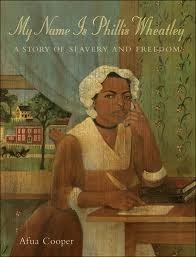 Congratulations to African Canadian author Afua Cooper whose 2009 MG novel, , has just won the 2012 Beacon of Freedom Award!
Congratulations to African Canadian author Afua Cooper whose 2009 MG novel, , has just won the 2012 Beacon of Freedom Award!
The Beacon of Freedom Award is presented annually to a book that introduces American history, from Colonial times through the Civil War, to children in a historically-accurate and engaging manner.
WRL is proud to welcome Afua Cooper, the 2012 recipient of the Beacon of Freedom Award. Ms. Cooper will accept the award at Friday, October 12 at 7 p.m. in the Williamsburg Library Theatre. A book sale and signing will follow.
I just taught June Jordan’s essay on Phillis Wheatley yesterday, and am proud to see an African Canadian author winning recognition for her work. Jordan’s essay considers the lasting power of white authentication, calling it a “miracle” that black authors manage to get their work published when so many literary conventions work against us…
 So I booked my flat in London for Christmas but I’m once again thinking of visiting Germany. Nyla grew up on a US military base in Germany and I really need to go over there to do some research. It helps that my novels have been selling well in Germany; Ship of Souls was Amazon.de’s Daily Deal yesterday and now that the deal is over, the book is *still* in the Top 100 on the Kindle Store (peaking at #14)! Wish also got a 5-star review, which I’m hoping to translate this morning…Danke, German readers, for giving my work a chance! (ETA I *just* got a query email from an agent in Germany!)
So I booked my flat in London for Christmas but I’m once again thinking of visiting Germany. Nyla grew up on a US military base in Germany and I really need to go over there to do some research. It helps that my novels have been selling well in Germany; Ship of Souls was Amazon.de’s Daily Deal yesterday and now that the deal is over, the book is *still* in the Top 100 on the Kindle Store (peaking at #14)! Wish also got a 5-star review, which I’m hoping to translate this morning…Danke, German readers, for giving my work a chance! (ETA I *just* got a query email from an agent in Germany!)


September 10, 2012
And the Crowd Goes Wild!
 Yesterday I took a break from writing to watch Serena Williams win the US Open. What an inspiration! As I post my word count on Facebook every few hours, I’m surprised at the number of people who express admiration for my sense of discipline. I’m not sure that’s what drives me…I feel like I have (or am) a sponge, and I spend most of my time soaking up ideas; writing then is simply the act of wringing that sponge dry. It’s the easy part, in a way. Last weekend I wrote 2450 words and another 120 during the week; so far this weekend I’ve written 2300 words, which puts me at 4870–below my 900 words/day quota (7×900=6300). But the day has just begun…
Yesterday I took a break from writing to watch Serena Williams win the US Open. What an inspiration! As I post my word count on Facebook every few hours, I’m surprised at the number of people who express admiration for my sense of discipline. I’m not sure that’s what drives me…I feel like I have (or am) a sponge, and I spend most of my time soaking up ideas; writing then is simply the act of wringing that sponge dry. It’s the easy part, in a way. Last weekend I wrote 2450 words and another 120 during the week; so far this weekend I’ve written 2300 words, which puts me at 4870–below my 900 words/day quota (7×900=6300). But the day has just begun…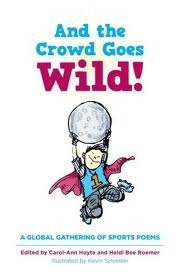 I have some exciting news to share:
And the Crowd Goes Wild!: A Global Gathering of Sports Poems
came out on September 4th! The book’s first review, which came out on Labor Day, is posted
here
. The ebook version (PDF file) and the paperback version can be purchased at
www.friesenpress.com/bookstore
. Folks are also welcome, of course, to order the paperback version of the book from local independent bookstores. The paperback version will become available on
Amazon.com
, Amazon.ca, and Amazon.co.uk later in September. Libraries/bookstores can order the collection from Ingram Book Company.
I have some exciting news to share:
And the Crowd Goes Wild!: A Global Gathering of Sports Poems
came out on September 4th! The book’s first review, which came out on Labor Day, is posted
here
. The ebook version (PDF file) and the paperback version can be purchased at
www.friesenpress.com/bookstore
. Folks are also welcome, of course, to order the paperback version of the book from local independent bookstores. The paperback version will become available on
Amazon.com
, Amazon.ca, and Amazon.co.uk later in September. Libraries/bookstores can order the collection from Ingram Book Company.



